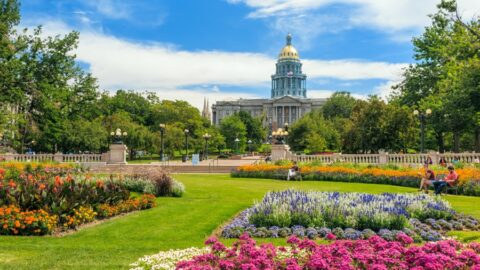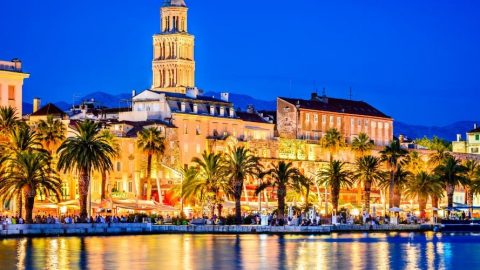(CNN) — Want to become Italian? If you have Italian ancestors in your family tree, it might be easier than you realize.
Thanks to the rule of jure sanguinis (“the right of blood”), Italy is one of the few countries in the world to offer the possibility of citizenship to many people who can trace their family roots back to an Italian ancestor.
There’s fine print, of course. It has to be an Italian ancestor who didn’t naturalize to a different nationality until the next person in the line of descent was born.
So, for example, if your grandfather was born in Italy and your dad was born in the United States before your grandfather became a US citizen, you are likely eligible for Italian citizenship.
If it sounds complicated, that’s because it can be.
The process invariably comes with a mountain of paperwork and records to acquire and translate from both the country where you live as well as from your ancestor in Italy (and all the ascendants in between). And there are plenty of caveats.
But sometimes everything hinges on finding a single, missing document buried away in an Italian village somewhere.

Francesco Curione, right, and a client meet with locals in the client’s ancestral town.
Francesco Curione
A chance Airbnb encounter
Since 2016, Curione, 34, has helped hundreds of clients, mostly from the United States, locate documents.
They range from baptismal records buried in earthquake- and fire-ravaged churches to a birth certificate for a baby given up for adoption at birth, unbeknownst to his ancestors. The cost? €110 (about $115) and up, depending on the complexity of the search.
It was a chance encounter with a Floridian who was looking for her own ancestors in Sicily that helped launch his booming business.
In 2016, Curione was fresh out of law school and unable to find a job due to Sicily’s high unemployment. He decided to turn to tourism as a potential way to earn a living, and opened his family’s ancestral home in the inland village of Collesano as an Airbnb.
“I liked the old-fashioned look of my grandmother’s house, but I wasn’t sure any Americans would,” Curione says about the humbly decorated three-bedroom home about 40 minutes inland from the touristic coastal town of Cefalu. The property with a 1950s kitchen and a washing machine on the terrace now has nearly 190 reviews on Airbnb and a rating of 4.9 out of 5 stars.
He was surprised when a guest from St. Petersburg, Florida, was the first to book the house.
Andrea Fonti was traveling to Collesano in search of a birth record for her great grandmother.
“She used to cry about wanting to go back to Sicily after she immigrated to the US,” Fonti says. “After she died, I wanted to go there to honor my family. And when I searched Airbnbs, there was just this one that had been listed a few days prior. I was like, well, I guess this is my only choice.”

Curione, right, assists a family in Carlentini, Sicily, where some of their ancestors lived.
Francesco Curione
An out-of-work lawyer finds a new calling
As soon as she booked it, she said Curione wrote to ask what was bringing her to the town that’s not usually on the tourist radar.
Fonti explained she was looking for a birth record and for information about a relative the family had lost touch with in the 1960s.
Within a few days, even before she’d arrived in Sicily, Curione texted her to tell her he’d found the family. They were his next door neighbors.
Fonti’s visit to Sicily became one of discovery, as Curione helped her find the house her great-grandmother grew up in, introduced her to the local priest to locate birth records and helped her find military records and other documents, she said.
“Without Francesco I would never have been able to trace my family history back to the 1700s,” says Fonti, who is currently in the process of applying for her Italian citizenship. “He becomes friends with clerks so easily and establishes a rapport. It’s amazing to watch him work.”
When she returned to the US, she posted about how he’d helped her in the Facebook group and spread the word among friends, too, drumming up Curione’s first official clients and encouraging him to launch his business.
“There weren’t a lot of jobs in South Italy,” Fonti says. “Between his personality and enthusiasm, I was like, you’re sitting on a gold mine.”

Finding missing records can be daunting. This is the State Archives in Palermo.
Francesco Curione
Each individual case is a puzzle to solve
Curione says his search for missing records in Italy is never boring.
Some cases solve themselves quite easily, while others lead down twisting and turning roads that can come with happy and sad surprises.
“Sometimes tough searches can be frustrating,” he says. “The information found can be sad. And of course, there are happy emotions with happy tears when we locate many records.”
His biggest successes include finding a book of baptismal records that happened to be from his client’s relative’s birth year. It was the only book salvaged from a church that had burned to the ground (taking every other baptism book from over the course of a century with it).
Another time, he learned through his search for a baptismal record in northern Italy that his client’s grandfather was a “foundling wheel” baby — meaning he was allegedly abandoned by his mother, left in a revolving door called a ruota dei proietti that protected the mother’s identity.
The client, Anissa Pescio, a nurse from Napa Valley, California, had never known her grandfather, Angelo Pescio, who died before she was born. She knew Angelo’s birthday and his parents’ names and had even gone to his birth town in Stella, Italy, to look for his birth record. But she’d had no luck.
When she hired Curione to take the case, he found the missing record in about a week. But the birth certificate was under a different name — the one the midwife had given her grandfather when she discovered the baby in the foundling wheel. But there were enough other details to match the record to her grandfather.
The midwife had named him Angelo Celeste, which means Blue Angel, according to detailed notes in the document, because of his piercingly blue eyes.
“I became very emotional when Francesco told me the news,” says Pescio, who finally understood where her daughter had gotten her beautiful blue-gray eyes — the only ones in the family. “I named her Angelina Celentina, long before I even knew my grandfather’s story,” she says.

Cameron Cipolla, seen here in Florence in 2017, recently learned that her application for Italian citizenship has been approved.
Cameron Cipolla
‘He digs’
Deena Cipolla Guptil and her niece, Cameron Cipolla, who live in Arkansas and California, had been researching their Sicilian family for nearly a decade, but a crucial piece of information remained missing about one of the family’s patriarchs.
Deena had spent hundreds of hours on Italian record sites, searching thousands of records in faded Italian script for her grandfather’s birth record, only to come up empty.
So they hired Curione. But they were disappointed when the commune again responded with a “negativo,” she says, informing them they could not locate their relative’s record.
“But Francesco doesn’t just go to the commune and take no for an answer,” says Deena. “He digs, he looks at other possible records and, if necessary, he calls in help from other priests or communes.”
She says Curione was able to get a “reluctant priest” to check the baptism records again himself, and that’s when the missing record was finally located.
“And, of course, because it’s Francesco, he didn’t just write me this in an email,” says Cameron, who just learned her Italian citizenship application has been approved.
“He sent me several voice messages that definitely captured his mutual excitement while he explained his process of finding the record.”
So why become Italian anyway?
Citizens of any country who have Italian ancestors that meet the requirements can apply, he says, but there could be limits depending on the laws and regulations of the specific country.
People from the US, Canada, United Kingdom, Argentina, Brazil and Australia are among the most frequent applicants, Permunian says.
The company offers partial and full-service assistance to people applying for Italian citizenship and has offices in Italy and California. It also has a family tree form that it will evaluate for free to let potential clients know if they have a path to Italian citizenship.
There are factors beyond missing documents that can trip up your quest, too. If a woman in your ancestral line gave birth to the next in line before 1948, when women were not afforded the same rights to pass on citizenship, it makes you a “1948 case.” And it would require a court case in Italy, which ICA also handles for its clients.
While Curione retrieves documents that pave the way to citizenship for many clients, he doesn’t deal in other aspects of gaining citizenship.

A lost birth certificate could be the key to citizenship for some aspiring Italians.
Francesco Curione
ICA’s business saw a huge spike in applications since April of 2020, Permunian says, from clients from “both sides of the political spectrum”– and that has only increased throughout the pandemic.
“Italian citizenship is one of the easiest you can get in the European Union, if you’re of Italian descent,” he says. “It’s much easier than for France or Ireland.” It also grants you the right to live and work anywhere in the EU without the need for a visa.
Additionally, Italian health care, which is almost free of charge and considered among the best in the world, is another perk of citizenship, Permunian says.
“Many baby boomers grew up the children of Italian immigrants and remember the days of a multi-generational household and Sunday dinner at Nonna’s,” Farina says. “Life is different now, and Italian citizenship is a tangible way to say, ‘I’m Italian’ and honor one’s roots while providing a legacy and opportunity to future generations.”

Curione asks locals for information to find living relatives for a client.
Francesco Curione
Sometimes a living nonna is the key to a piece of history gone missing
Curione is tenacious in seeking that legacy for clients. When he hits a brick wall in a search, he goes to the places Italians have long gathered to talk — the piazza, or the village’s central square.
“When you start asking questions there, everyone starts to give you information,” he says. “They start to say, ‘Yes! Go into this bar, or go down that street.'”
And the older women of the village, in particular, are like “an archive alive because they know the memories of the town.”
Finding a lost record is like doing a puzzle, he says. “People will tell me their ancestors are from Palermo, then it turns out they were from the middle of the island.”
When he brings clients to visit their ancestral village, they often cry.
“They imagine their ancestors playing there, living there,’ he says. “They see the church where they were baptized.”
“I also have much admiration for American citizens who have never forgotten their land of origins, their veins still flowing with Italian blood that acts as a reminder of their family history,” says Curione.
And for all the people he’s helped connect with their past, Curione’s biggest admirer might be his mother.
“My mom is super proud of me. When boxes full of Reese’s cups arrive in the mail, she says, ‘I’m happy you have tons of friends.'”
“Americans find really sweet ways to thank me,” he says. “It’s better than getting money. They found their family — but they also found a friend.”
Top image courtesy of Francesco Curione





Recent Comments